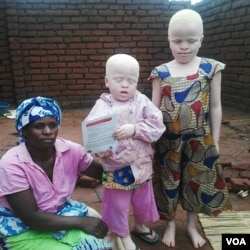In central Malawi, a mother woke to find that her baby daughter had been snatched from her side during the night.
The girl was the latest victim in a wave of abductions and attacks targeting albinos, whose body parts are highly sought after on the regional black market.
The mother shouted for help, said Edna Mzingwitsa, the police spokesperson for Kasungu district, “but when neighbors came, they tried to search for the baby but could not trace her."
2 suspects arrested
The spokeswoman told VOA that two suspects have been arrested, including the baby's father. She said investigations continue and the baby is still missing.
The abduction came a month after a 9-year-old albino boy was found beheaded in eastern Malawi.
The danger has become so acute that Malawi's president gave a national address this month pledging action.
"This is evil and a threat to the most fundamental human rights in our constitution,” President Peter Mutharika told the nation. “Let me assure you that government is taking serious steps against this criminal behavior, and will overcome this. We have intensified surveillance and investigations in affected districts and the country as a whole."
Mutharika called specifically on the judiciary to issue "stiffer penalties to the culprits."
Black market potions
People with albinism — an absence of pigment in their skin, hair and eyes — are targeted in Malawi and other parts of Africa because of a false belief that potions made from their body parts will bring good luck and wealth.
Those involved are rarely found and, when they are, the penalties are often criticized as too lenient. Last year, a court in southern Malawi ordered a man found with albino body parts to pay a fine of $30. He was charged with "possessing human tissue," which carries a maximum sentence of three years in jail.
Police have recorded at least 50 attacks on albinos in the past three years. The attacks have sparked both outrage and fear.
"When I am working late, I always think of my life and when I go out, I always think of what will I do if I face such [a] situation,” said Ian Simbota, a journalist with albinism working for the state-run Malawi Broadcasting Corporation.
The majority of attacks on albinos have been in Machinga district near the border with Mozambique, where the body parts are reportedly sold to witch doctors.
Past efforts
In 2015, the government created a task force of police, traditional and religious leaders and a local albino association to address the attacks.
The strategy was to identify the homes and schools of people with albinism and check on them regularly. However, the task force no longer functions because of a lack of funding, according to Boniface Massa, the president of the Association of People with Albinism in Malawi.
"And as a result of the task force being dormant, this is what has led to the restart of the attacks on persons with albinism,” Massa said. “All we are saying is that the political will and the effort by the police must really translate into actual ending of the attacks."
Malawi should begin by following Tanzania's lead, Massa says, and banning witch doctors as a way to cut off demand for human body parts.





